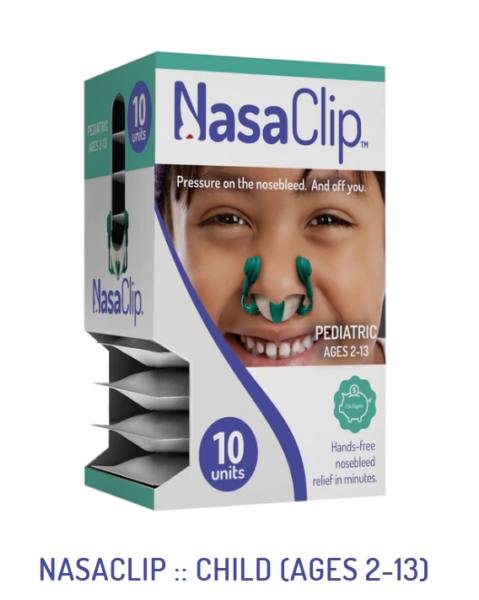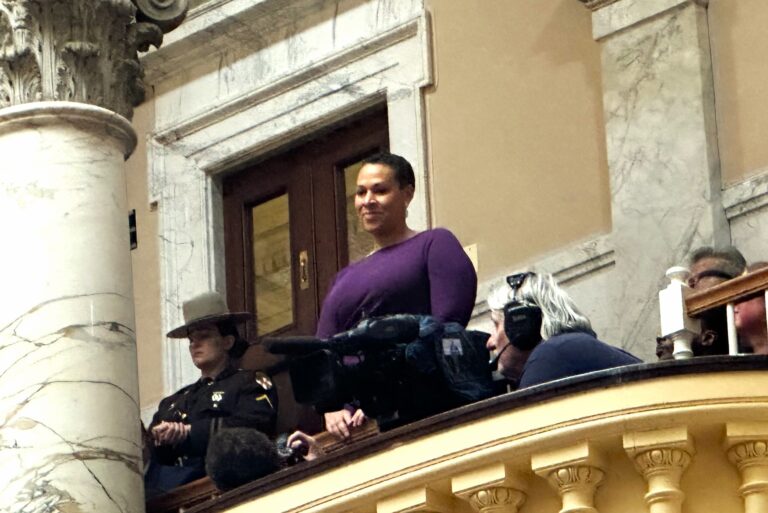
Elizabeth Claiborne, an emergency room doctor and mother of two in Laurel, is trying to better treat nosebleeds, a common irritation among children and the elderly.
Even though the risks associated with nosebleeds are relatively low, a surprising number of people go to the emergency room for nosebleeds, Claiborne said.
“In fact, in the United States, about 500,000 people a year visit the emergency department with nosebleeds, which is hard for people to believe,” she said in an interview with Maryland Matters. “It is most common in children between the ages of 2 and 10 and older adults between the ages of 55 and 80, especially if they are taking blood thinners.”
Claiborne was born and raised in Denver, but did his emergency room training at George Washington University. She is an adjunct assistant professor of emergency medicine at the University of Maryland School of Medicine, and she is the founder and CEO of NasaClip, which developed a hands-free device to stop nosebleeds.
Gov. Wes Moore (D) praised Claiborne, who was speaking in the House gallery, during Wednesday's State of the Union address as an example of a Black woman who has overcome challenges through Maryland's entrepreneurship program.
He said people who come to the emergency room with nosebleeds usually don't require serious medical care, but some people don't treat their nosebleeds properly and are unable to stop the bleeding.
“Many people make the mistake of dealing with nosebleeds by tipping their head back instead of forward…They can’t maintain constant pressure, which is one of the most difficult problems. “Because you have to maintain pressure,” she said. “And it's very difficult to do that, especially in small children or the elderly, or if they're bleeding and panicking. .Then the bleeding won't stop and I end up in the ER.”
The problem of nosebleeds in emergency rooms has led to major concerns about longer wait times in emergency departments in Maryland.
Claiborne said that as an ER doctor, he feels that nosebleeds are usually not a serious medical problem and are fairly easy to deal with. But with fewer emergency department staff and a growing number of patients, people can wait hours to see a medical professional.
“So even if you have a simple problem like a nosebleed, you might wait for hours because we can't get you back,” she said.
That led her to develop a product called NasaClip, which can be placed on a patient's nose to stop bleeding.
“One of the things I love about NasaClip is that we can start treating patients right away,” she said. “The device is available over-the-counter, so it can be applied in advance by nurses, technicians, and patients themselves. It can be used to begin treatment and manage the patient from the waiting room, and in some cases to discharge the patient from the waiting room. You can also.”

NasaClip for pediatric patients with nosebleeds. Brought to you by NasaClip website.
In 2023, NasaClip received a total startup investment of $750,000 from the Maryland Technology Development Corporation (TEDCO). TEDCO is an independent organization established by the Maryland General Assembly in 1998 to support business and economic opportunity across the state.
Clayborne hopes NasaClip will become a “Band-Aid for nosebleeds.” This means NasaClip will be readily available in everyday homes and stocked in child care facilities, athletic and sports facilities, school clinics, and hospitals. Currently, the average price per unit is $17, he said, but Clayborne said the company is working on a lower-priced version.
In his speech, Moore praised Claiborne's tenacity, dedication to medicine, and entrepreneurial spirit.
“As a woman of color, she struggled to find funding to get her ideas off the ground… Claiborne doesn't give up. At the height of COVID-19 she was six months pregnant. But he continued to work on the front lines at Prince George's Hospital Center,” Moore said. “She raised enough money to start a business, and now she's the founder and CEO of her own medical device company focused on supporting children and families. And it's located in Maryland. It’s in Baltimore.”
Claiborne said early startup support from TEDCO helped get the business off the ground, but it was critical because women and people of color are often ignored by venture capitalists and other investors. said.
She said she was honored to be recognized by the governor and hopes it will be a moment of inspiration for other Black women and others living in Maryland to pursue entrepreneurial endeavors. .
“I believe that representation is important,” she said. “I want to be a role model for other young women and minorities to pursue their entrepreneurial dreams.”


